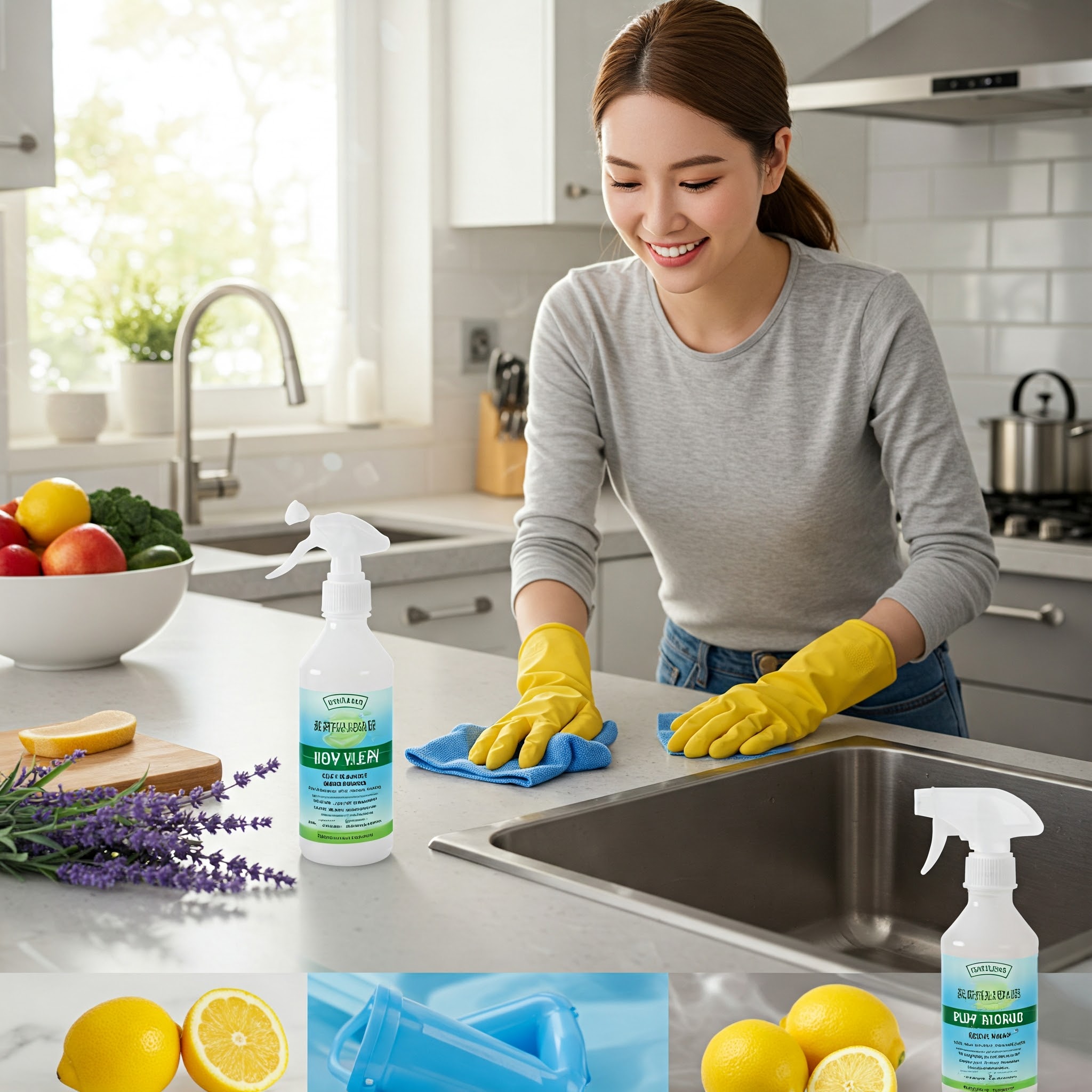A smelly kitchen can dampen your mood, make cooking feel like a chore, and even embarrass you when guests pop by.
Table of Contents
ToggleIf you’re a woman (or anyone, really) battling persistent kitchen odors, you’re not alone—and you’re in the right place.
I’ve tackled every kind of kitchen stink imaginable, from garbage can gremlins to sneaky fridge culprits.
In this guide, I’m sharing my battle-tested, step-by-step plan to keep your kitchen smelling fresh, inviting, and downright delightful.
We’ll cover everything from quick fixes to deep-cleaning rituals, troubleshoot common pitfalls, and even throw in some pro tips to make your kitchen a scent-sational haven.
By the end, you’ll have a clear roadmap to banish bad odors for good—no air freshener overload required. Let’s dive in!
Why Does My Kitchen Smell Bad?
Bad kitchen odors are more than just a nuisance—they’re a sign something’s off. From my decade of tackling smelly kitchens, here’s what I’ve learned about the culprits:
- Rotting Food: Leftovers in the fridge, scraps in the garbage disposal, or a forgotten onion in the pantry can turn funky fast.
- Grease and Spills: Cooking splatters on the stove or grease trapped in drip pans create a sticky base for odors to cling to.
- Poor Ventilation: Without airflow, smells from cooking or trash linger, making the air feel heavy and stale.
- Mold and Mildew: Damp areas under the sink or in drains can breed musty smells, especially in humid climates.
- Dirty Appliances: Fridges, dishwashers, and microwaves harbor crumbs, spills, and bacteria if not cleaned regularly.
Understanding these causes is the first step to a fresher kitchen. Now, let’s zero in on where those smells are coming from.
Which Are the Places in the Kitchen from Where Bad Smells Can Come?
Bad odors love to hide in specific kitchen hotspots. Here’s a rundown of the usual suspects, based on years of sniffing out trouble:
- Garbage Disposal: Food particles get trapped and rot, creating a sour stench.
- Trash Can: Even with liners, leaks or residue build up, especially if you toss smelly foods like fish.
- Fridge and Freezer: Expired items, spills, or moldy seals can make opening the door a grim experience.
- Sink Drain: Grease, food bits, and soap scum combine into a smelly sludge.
- Dishwasher: Food trapped in filters or standing water breeds bacteria and mildew.
- Stove and Drip Pans: Burnt crumbs and grease turn rancid over time.
- Pantry or Cabinets: Forgotten veggies or spilled spices can create a musty vibe.
- Under Appliances: Dust, crumbs, and grease collect in hard-to-reach spots, festering unnoticed.
- Sponges and Dishcloths: Wet, overused cleaning tools are breeding grounds for bacteria.
Knowing these spots helps you target your cleaning efforts. Let’s move on to actionable steps and answer your questions about keeping your kitchen smelling amazing.
How to Make Your Kitchen Smell Good Naturally
Why It Matters: Chemical air fresheners mask odors and can clash with food aromas. Natural solutions are safer, cheaper, and more effective long-term.
How to Do It:
- Citrus Power: Boil a pot of water with lemon or orange peels for 10 minutes to release a fresh scent. Add a cinnamon stick for warmth.
- Vinegar Magic: Place a bowl of white vinegar near odor sources overnight—it absorbs smells without leaving a trace.
- Herb Infusion: Tie fresh herbs like rosemary or mint in a sachet and hang near the stove for subtle fragrance.
- Baking Soda Boost: Keep an open box in the fridge or sprinkle it in the trash can to neutralize odors.
Pro Tip: Grow a small basil or mint plant on your windowsill. It’s decorative, smells great, and doubles as a cooking ingredient.
Challenge: Natural scents fade quickly.
Solution: Refresh daily and combine methods (e.g., vinegar at night, citrus during the day).
How to Make Your Kitchen Smell Good After Cooking
Why It Matters: Cooking smells like garlic or curry are delicious during dinner but less charming hours later.
How to Do It:
- Ventilate Immediately: Run the range hood and open windows during and after cooking to whisk away odors.
- Simmer a Neutralizer: Post-cooking, simmer water with a splash of vinegar or a few cloves to clear the air.
- Wipe Surfaces: Grease splatters trap smells. Wipe counters, stove, and cabinets with a vinegar-water mix (1:1 ratio).
- Clean Tools Fast: Wash cutting boards and knives right after use, especially for pungent ingredients like onions.
Pro Tip: Rub stainless steel (like a spoon) on your hands to remove garlic or fish smells after prep.
Challenge: Strong smells linger on fabrics.
Solution: Wash kitchen towels or curtains weekly and spritz with a fabric refresher.
How to Get Rid of Cooking Smells in a Small Apartment
Why It Matters: Tiny spaces amplify odors, and there’s nowhere for smells to hide in a compact kitchen.
How to Do It:
- Maximize Airflow: Use a portable fan to push air toward an open window or door.
- Air Purifier: Invest in a small purifier with a carbon filter to trap cooking odors.
- Contain Smells: Cover pots while cooking to limit odor spread, and store leftovers in airtight containers.
- Quick Clean: Wipe down surfaces and empty trash daily to prevent odor buildup in tight quarters.
Pro Tip: Place a small bowl of activated charcoal near the stove—it’s a powerhouse for absorbing smells in small spaces.
Challenge: No windows in the apartment.
Solution: Lean on an air purifier and simmer neutralizers like vinegar to keep air fresh.
How to Get Food Smell Out of the House Fast
Why It Matters: When guests are coming or you just want a reset, you need odors gone now.
How to Do It:
- Ventilate Aggressively: Open all windows and doors for 10–15 minutes to flush out smells.
- Coffee Grounds Hack: Place a bowl of used coffee grounds in the kitchen for 1–2 hours to absorb odors.
- Baking Soda Blitz: Sprinkle baking soda on carpets or rugs, let sit for 15 minutes, then vacuum to lift smells.
- Essential Oil Spray: Mix 10 drops of lemon essential oil with water in a spray bottle and mist the air.
Pro Tip: Speed up odor removal by placing a fan near an open window to pull stale air out faster.
Challenge: Smells linger in furniture.
Solution: Sprinkle baking soda on upholstery, wait 20 minutes, and vacuum
Best Kitchen Odor Eliminator
Why It Matters: When guests are coming or you just want a reset, you need odors gone now.
How to Do It:
- Ventilate Aggressively: Open all windows and doors for 10–15 minutes to flush out smells.
- Coffee Grounds Hack: Place a bowl of used coffee grounds in the kitchen for 1–2 hours to absorb odors.
- Baking Soda Blitz: Sprinkle baking soda on carpets or rugs, let sit for 15 minutes, then vacuum to lift smells.
- Essential Oil Spray: Mix 10 drops of lemon essential oil with water in a spray bottle and mist the air.
Pro Tip: Speed up odor removal by placing a fan near an open window to pull stale air out faster.
Challenge: Smells linger in furniture.
Solution: Sprinkle baking soda on upholstery, wait 20 minutes, and vacuum



